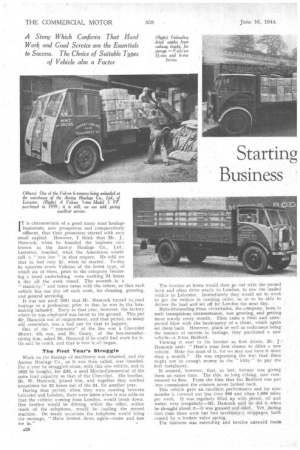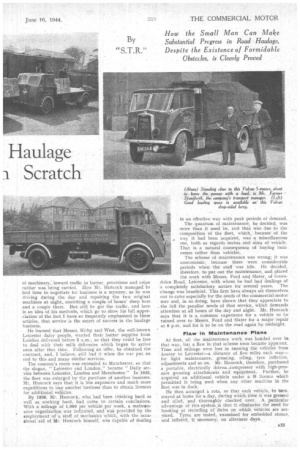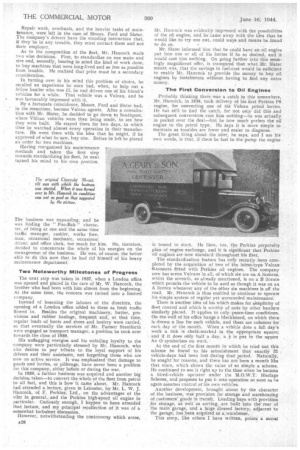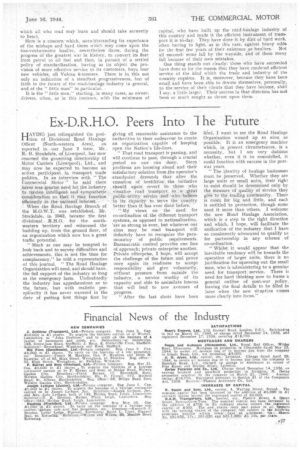• Starting Business Haulage Scratch
Page 26

Page 27

Page 28

Page 29

If you've noticed an error in this article please click here to report it so we can fix it.
A Story Which Confirnis That Hard Work and Good Service are the Essentials to Success. The Choice of Suitable Types of Vehicle also a Factor
How the Small Man Can Make Substantial Progress in Road Haulage, Despite the Existence of Formidable Obstacles, is Clearly Proved
IT is characteristic of a good many road haulage businesses, now prosperous and comparatively affluent, that their promoters started with very small capital. However, I think that Mr. J. Hancock, when he founded the business now known as the Anstey Haulage Co., Ltd., Leicester, touched, what the Americans would call, a ' new low " in that respect. He told me that he had only 2d. when he started. To-day he operates seven Vulcans of the latest type, of which six of them, prior to the company becoming a hired undertaking were working 24 hours a day all the week round. The seventh „ is a " stand-by," and takes turns with the others, so that each vehicle has one day off each week, for cleaning, greasing, and general servicing.
It was not until 1931 that Mr. Hancock turned to,road haulage as a profession; prior to that he was in the boxmaking inclustrS,. Early in that year, however, the factory where he was employed was burnt to the ground. This put Mr. Hancock out of employment, and that period, as many will remember, was a bad one for that to happen.
One of the " remnants" of the fire was a Chevrolet 30-cwt, tilt van, and Mr. Geary, of the box-manufacturing firm, asked Mr. Hancock if he could find work for it. He said he could, and that is how it all began.
The First Year's Struggle
Work on the haulage of machinery was obtained, and the Anstey Haulage Co., as it was then called, was founded. For a year he struggled alone, with this One vehicle, and in 1932 he botrght, for 250, a used Morris-Commercial of the same load capacity as that of the Chevrolet. His brother, Mr. W. Hancock, joined him, and together they worked sometimes for 22 hours out of the 24, for another year.
During that period, when they were running between Leicester and London, there were times when it was odds-on that the vehicle; coming from London, would break down. One brother would be driving, whilst the other, within reach of the -telephone. would beloading the second machine. On many occasions the telephone would bring the message, " Have broken down again—come and tow me in."
The brother at home would then go out with the second lorry and often drive nearly to London, to tow the loaded vehicle to Leicester. Immediately they would set to work to get the vehicle in running, order, so as to be able to deliver the load and set off for London the next day.
Notwithstanding these vicissitudes, the company, born in such inauspicious circumstances, was growing, and getting more sturdy every. month. Then came a fresh and unexpected blow with the bankruptcy of a client, which again set them back. However, pluck as well as endurance being the essence of success in haulage, they purchased a new vehicle—a 2-ton Bedford,
Turning it over to his brother as first driver. Mr. J.Hancock said: "Here's your first chance to drive a new ' vehicle. Make the most of it, for we may not have it more than a month." He was expressing the fear that there might not be enough money in the " kitty " to pay the first instalment.
It seemed, however, that, at last, fortune was giving them an easier time. The tide, so long ebbing, now commenced to flow. From the time that the Bedford was put into commission the concern never looked back.
This vehicle gave an excellent. performance and for nine months it covered not less than 900 and often1,000 miles per week. It was regularly filled up with petrol, oil and water; very irregularly—Mr. Hancock said he did it when he thought about it—it was greased and Oiled. Yet, 'during that time there were but two involuntary stoppages, both caused by a broken valve spring.
The business was extending and besides outwaid loads
of machinery; inward traffic in butter, provisions and cr&pe robber was being carried. How Mr. Hancock managed to find time to negotiate for business is a mystery, as he was driving during the day and repairing the two original machines at night, snatching a couple of hours' sleep here and a couple there. But still he got the traffic, and here is an idea of his methods, which go to show his full appreciation-of the fact I have so frequently emphasized in these articles, that service is the secret of success in the haulage business.
He learned that Messrs. Kirby and West, the well-known Leicester dairy people, wanted their butter supplies from London delivered before 5 a.m.-, so that they could be free to deal with their milk deliveries which began to arrive soon after that time. Following an offer, he obtained the contract, and, I believe, still had it when the war put an end to this and many similar services.
The concern's route was extended to Manchester, so that the slogan, " Leicester and London," became "Daily service between Leicester, London and Manchester." In 1935, the fleet was enlarged by the purchase of another. business. Mr. Hancock says that it is less expensive and much more expeditious to buy another business than to obtain licences for additional vehicles.
By 1936, Mr. Hancock, who had been thinking hard as well as working hard, had come to certain conclusions. With a mileage of 1,000 per vehicle per week, a maintenance organization was indicated, and was provided by the employment of a staff, of mechanics which, with the occasional aid of Mr. Hancock himself, was capable of dealing
in an effective way with peak periods of demand. The quantum of maintenance, he decided, was more than it need be, and that was due to the composition of the fleet, which, because of the .,, way it had been acquired, was a miscellaneous one, both as regards makes and sizes of vehicle. That is a natural consequence of buying businesses rather than vehicles.
The scheme of maintenance was wrong; it was uneconomic, because there were considerable periods when the staff was idle. He decided, therefore, to put out the maintenance, and placed the work with Messrs. Ford and Slater, of Gwendolen Road, Leicester, with whom he had had dealings of a completely satisfactory nature for several years. The change was beneficial_ This firm have always set themselves out to cater especially for the needs of the commercial-motor user and in so doing, have shown that they appreciate to the full the peculiar needs of that service, which demands attention at all hours of the day and night. Mr. Hancock• says that it is a common experience for a vehicle to i.e turned over to Messrs. Ford and Slater for a major repair at 6 p.m. and for it to be on the road again by midnight.
Flaw in Maintenance Plans At first, all the maintenance work was handed over in that way, but a flaw in that scheme soon became apparent. Time and mileage were lost in running the vehicles from Anstey to Leicester—a distance of five miles each way— for light maintenance, greasing, oiling, tyre inflation, adjustments and so on. Mr. Hancock, therefore, purchased a portable, electrically driven ,compressor with high-pressure greasing attachments and equipment. Further, he acquired an additional vehicle under a B licence which permitted it being used when any other machine in the fleet was in dock.
He then arranged a rota, so that each vehicle, in turn, stayed at home for a day, during which time it was greased and oiled, and thoroughly checked over. A particular advantage of this system is that it eliminates the need for booking er recording of dates on which vehicles are serviced. Tyres are tested, examined for embedded stones, and inflated, if necessary, on alternate days.
Repair work, overhauls, and the heavier tasks of maintenance, were left in the care of Messrs. Ford and Slater. The company's drivers have the staeding instruction that. if they be in any trouble, they must contact them and not their employer.
As to the composition of the fleet, Mr. Hancock made two wise decisions. First, to standardize on one make and size and, secondly, bearing in rnind the kind of work done, to buy machines that were long-lived and as free as possible from trouble. He realized that price must be a secondary consideration.
In turning over in his mind this problem of choice, he recalled an experience he once had, when, to help out a fellow haulier who was ill, he tiad driven one of his friend's vehicles for a while. That vehicle was a Vulcan, and he was favourably impressed with it.
By a fortunate coincidence, Messrs. Ford and Slater had. in the meantime, become Vulcan agents. After a consultation with Mr. Slater, he decided to go down to Southport,. where Valcan vehicles were then being made,' to see how they were built. He stayed there for two days, in which time he watched almost every operation in their 'manufacture. He went there with the idea that he might, if he approved of what he saw, buy one. Before he left he placed an order for two machines.
Having reorganized his maintenance methods and taken the first step towards standardizing his fleet, he next. turned his mind to his own position.
The business was expanding, and he was finding the " Poo-Bab" character, of being at one and the same time traffic manager, cashier, works foreman, occasional mechanic, occasional driver, and office clerk, too much for him. He, therefore, decided to concentrate the whole of his energies on the management of the business. He was, of course, the better able to clb this now that he had rid himself of his heavy maintenance department.
Two Noteworthy Milestones of Progress
The next step was taken in 1937, when a London office was opened and placed in the care of Mr, W. Hancock, the brother who had been with him almost from the beginning. At the same time, the concern was turned into a limited company.
Instead of lessening the labours of the directdrs, the opening of a London office added to them as fresh traffic flawed in. Besides the original machinery, butter, provisions and rubber haulage, frequent and, at that time, regular loads of boots and shoes and hosiery were carried, so that eventually the services of Mr. Farmer Staniforth were engaged as transport manager, a position he took over towards the close of 1939.
His unflagging energies and his unfailing loyalty to the company were particularly stressed by Mr. Hancock, who also desires to pay tribute to the loyal support of his drivers and their assistants, not forgetting those who are now on active service. It was emphasized that damage to goods and lorries, or pilferage, have never been a problem for this company, either before or during the war.
In 1939, a further business was acquired and another big decision taken—to convert the whole of the fleet from petrol to oil fuel, and this is how it came about. Mr. Hancock had attended a lecture, given in Leicester, by Mr. I.., W. J. Hancock, of F. Perkins, Ltd., on the advantages of the oiler in general, and the Perkins high-speed oil engine in particular. Curiously enough, I happen to have, attended that lecture, and my principal recollection of it was of a somewhat turbulent discussion.
However, notwithstanding the controversy which arose,
Mr. Hancock was evidently impressed with the possibilities of the oil engine, and he-came away with the idea that he would like to try one out, could ways and means be found to do so, Mr. Slater informed him that he could have an oil engine put into one or all of his lorries if he so desired, and it would cost him nothing. On going further into this seemingly magnificent offer, it transpired that what Mr. Slater meant was, that the savings in fuel-cost would be sufficient to enable Mr. Hancock to provide the money to buy oil engines by instalments without having to find any extra money.
The First Conversion to Oil Engines Probably thinking there was a catch in this somewhere, Mr. Hancock, in 1939, took delivery of his first Perkins P6 engine, for converting one of his Vulcan petrol lorries. He has still to find the catch, for not only did this and subsequent conversions cost him nothing—he was actually in pocket over the deal—but he now much prefers the oil engine to the petrol type. He says it is more simple to maintain as troubles are fewer and easier to diagnose.
The great thing about the oiler, he says, and I use his own words, is that, if there be fuel in the pump the engine is bound to start. He likes, too, the Perkins perpetuity plan of engine exchange, and it is significant that Perkins oil engines are now standard throughout his fleet.
The standardization feature has onlY recently been completed by the acquisition of two of the latest-type Vulcan 6-tonnets fitted with Perkins oil engines. The company now has seven Vulcans in all, of which six are on A licences, whilst the seventh, as already mentioned, is on a B licence which permits the vehicle to be used as though it was on an A licence whenever any of the other six machines is off the road. Mr. Hancock is thus enabled to continue to Operate his simple system of regular yet unrecorded maintenance.
There is another idea of his which ma•kes for simplicity of fleet control and which is worthy of note by other hauliers similarly plae-,ed. It applies to only peace-time conditions. On the wall of his office hangs a blackboard, on which there is drawn a line for each vehicle, and there are columns for each day of the month. When a vehicle does a full day's work a tick is chalk-marked in the appropriate square: and if it does only half a day, a is put in the square An 0 symbolizes no work.
At the end of the first month in which he tried but this scheme he found to his astonishment that exactly 31 vehicle-days had been lost during that period. Naturally, he sought for reasons, and there has not been a month like that since, which shows the value of so simple a scheme. He continued to use it right up to the.tinie when he became a hired-vehicle operator under the M.O.W.T: Haulage Scheme, and proposes to put it into operation so soon as he again assumes control of his own N;ellicles.
Another development, brought about by the character of the business, was provision for storage and warehousing of customers' good S in transit. Loading bays with provision for storage, as well as sorting, are built into the rear of the main' garage, and a large disused factory, adjacent to the garage, has been acquired as a warehouse.
This story, like others I have written, points a moral which all who read may learn and should take earnestly to heart.
Here is a concernwhich, notwithstanding its experience of the mishaps and hard times which may come upon the too-:venturesotrie haulier, nevertheless dares, during the progress of the greatest war in history, to convert its fleet from petrol to oil fuel and then, in pursuit of a settled policy of standardization, having as its object the provision of more effective service to its customers, buys four new vehicles, all Vulcan 6-tonners. There is in this not only an indication of a steadfast progressiveness, but •of faith in the future of the road-haulage industry in general, and of the "little man" in particular.
It is the "little men," starting, in many cases, as ownerdrivers, often, as in this instance, with the minimum of capital, who have built up the road-haulage industry of this country and made it the efficient instrument of transport it is to-day. They have done it by dint of hard work, often having to fight, as in this case, against heavy odds for the first few years of their existence as hauliers. Not all succeed: some fall by the wayside, and of them many fail because of their own mistakes.
One thing stands out clearly: those who have succeeded have done so for the reason that they have rendered efficient service of the kind which the trade and industry of the country requires. It is, moreover, because they have been small and have been able to devote themselves, personally, to the-service of their clients that they have become, shall I say, a little larger. Their success in that direction has not been so much sought as thrust upon them.




















































